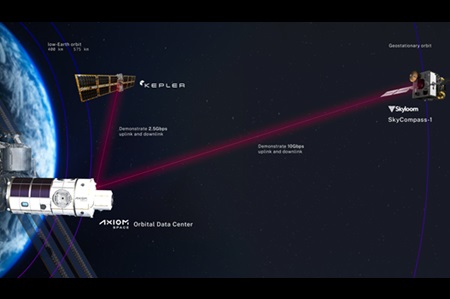
Axiom Space has entered into agreements with Kepler Communications US Inc. and Skyloom Global Corp. to integrate and showcase high data rate Optical Intersatellite Links (OISLs) on the first module of its commercial space station, Axiom Station. Simultaneously, Axiom Space is advancing the development of the world’s first scalable, cloud technology-enabled commercial orbital data centre, set to be housed on Axiom Station.
The inaugural phase of the Orbital Data Center capability (ODC T1) is poised to play a pivotal role in transforming low-Earth orbit (LEO) into a global space marketplace. This endeavour focuses on maturing technologies and infrastructure for large-scale, secure space-based data processing. A key feature of the orbital data centre is its “Earth independence,” enabling in-space cloud services without reliance on terrestrial cloud infrastructure. ODC T1 aims to operationalise data processing and management applications for Axiom Space’s customers, laying the groundwork for future lunar and Mars use cases that demand on-premises data processing to support exploration and economic development beyond Earth’s orbit.
The collaboration with Kepler and Skyloom will facilitate the demonstration of OISLs, allowing data transmission to and from the orbital data centre via the Kepler and Skyloom relay constellations. These OISLs will support data throughput of up to 10 gigabits per second and comply with Space Development Agency (SDA) interoperability standards.
Commenting on the deal, Jason Aspiotis, Axiom Space’s Director of In-Space Infrastructure and Logistics, said: “This is a pivotal moment for in-space data processing infrastructure and capabilities. For the past two years, our team has been demonstrating proof of concepts and developing use cases for in-space data processing infrastructure. The ODC T1 effort and collaboration with Kepler and Skyloom will help us realise our vision of building and operationalising the world’s first orbital data centre. The data centre will provide unprecedented data storage and processing capacity in a commercial, scalable, and economical way to aid microgravity researchers, Axiom Station users, and satellites in LEO, medium-Earth orbit (MEO) and Geosynchronous Equatorial Orbit (GEO) through optical communications relays and via the extended mesh network.”
To prepare for the ODC T1 deployment, Axiom Space plans to install a smaller data processing prototype aboard the International Space Station for testing and showcasing initial capabilities. The prototype, scheduled for launch in 2024, will explore applications in artificial intelligence, machine learning, data fusion, and space cybersecurity.
Axiom Space is actively conducting demonstrations on the AWS Snowcone currently aboard the space station, affirming the basic utility of a data centre in space and implementing processes and procedures for future orbital data centre operations.
Aspiotis added: “We will work to validate use cases at a sub-scale and, at the same time, obtain flight heritage on the underlying data centre hardware. Having a prototype on the ISS will serve as a building block toward the roughly half-cubic-meter-sized data server rack we plan to launch by 2027.”
Steve Bennett, Chief Operating Officer for Kepler, stated: “Kepler’s SDA-compatible space relay network leverages the latest technological advances in optical communications. We are pleased to partner with Axiom Space to provide 24-7 on-orbit capabilities to demonstrate the benefits our low latency, high-throughput data relay network can provide Axiom Space’s orbital data centre. With the proliferation of spacecraft in LEO, the demand for continuous, high-capacity connectivity in orbit continues to grow. The Kepler Network is designed to help close the business case for commercial space stations, Earth observation companies, and other space operators requiring low latency and high bandwidth connectivity.”
Eric Moltzau, Skyloom’s Chief Commercial Officer, commented: “Skyloom is excited to partner with Axiom Space. This demonstration will prove the competitive advantages of our SkyCompass-1 optical communications network, which we are jointly developing and deploying with Space Compass and which will offer services beginning in 2025. This project with Axiom Space will illustrate SkyCompass-1’s low latency, high bandwidth network capabilities.
Moltzau added: “Skyloom is a network service provider and space-based telecom equipment manufacturer. We build all the infrastructure to support network services and we see the partnership with Axiom Space as a tremendous opportunity to grow together to provide these services for all kinds of commercial and government users. This demonstration is the start of laying the initial infrastructure for a Commercial Space Internet to flourish in near earth orbit and on a planetary scale.”
Once Axiom Station Hab One (AxH1) is connected to the ISS, the data centre hardware and optical communications terminals will be integrated into AxH1 for initial testing. ODC T1 is planned to launch by 2027, with testing expected to prove an array of capabilities, including 24/7 and high-bandwidth data connectivity, real-time voice and video capabilities, high-speed data transport, connectivity and interoperability between satellites, and orbital data centre use cases.
The commercialisation of LEO is poised to stimulate new markets and drive innovations, with space-based data centres playing a crucial role in creating a sustainable communications ecosystem supporting human spaceflight, exploration, and commerce in space to generate economic and social value globally.












Add Comment